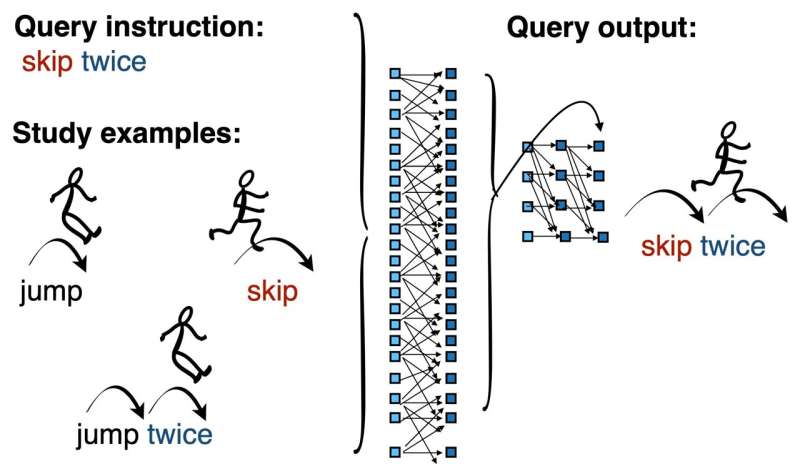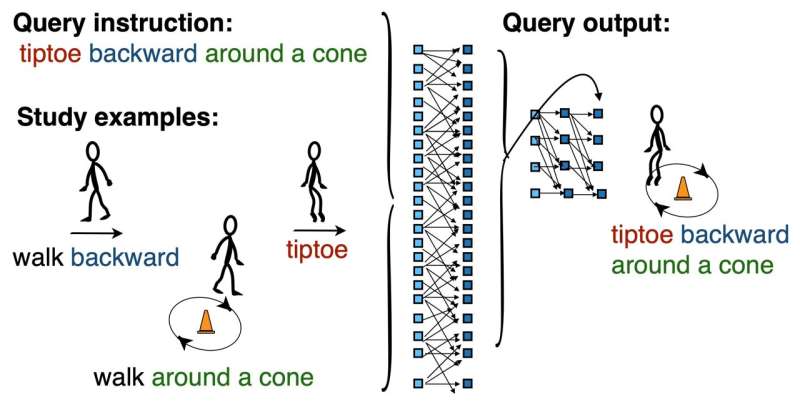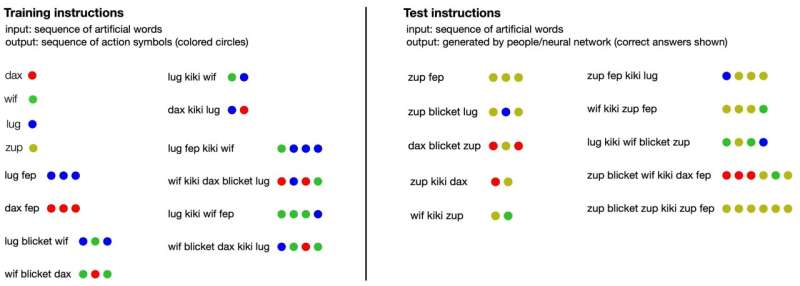This article has been reviewed according to Science X's editorial process and policies. Editors have highlighted the following attributes while ensuring the content's credibility:
fact-checked
peer-reviewed publication
trusted source
proofread
Can AI grasp related concepts after learning only one?

Humans have the ability to learn a new concept and then immediately use it to understand related uses of that concept—once children know how to "skip," they understand what it means to "skip twice around the room" or "skip with your hands up."
But are machines capable of this type of thinking? In the late 1980s, Jerry Fodor and Zenon Pylyshyn, philosophers and cognitive scientists, posited that artificial neural networks—the engines that drive artificial intelligence and machine learning—are not capable of making these connections, known as "compositional generalizations." However, in the decades since, scientists have been developing ways to instill this capacity in neural networks and related technologies, but with mixed success, thereby keeping alive this decades-old debate.
Researchers at New York University and Spain's Pompeu Fabra University have now developed a technique—reported in the journal Nature—that advances the ability of these tools, such as ChatGPT, to make compositional generalizations.
This technique, Meta-learning for Compositionality (MLC), outperforms existing approaches and is on par with, and in some cases better than, human performance. MLC centers on training neural networks—the engines driving ChatGPT and related technologies for speech recognition and natural language processing—to become better at compositional generalization through practice.

Developers of existing systems, including large language models, have hoped that compositional generalization will emerge from standard training methods, or have developed special-purpose architectures in order to achieve these abilities. MLC, in contrast, shows how explicitly practicing these skills allow these systems to unlock new powers, the authors note.
"For 35 years, researchers in cognitive science, artificial intelligence, linguistics, and philosophy have been debating whether neural networks can achieve human-like systematic generalization," says Brenden Lake, an assistant professor in NYU's Center for Data Science and Department of Psychology and one of the authors of the paper. "We have shown, for the first time, that a generic neural network can mimic or exceed human systematic generalization in a head-to-head comparison."
In exploring the possibility of bolstering compositional learning in neural networks, the researchers created MLC, a novel learning procedure in which a neural network is continuously updated to improve its skills over a series of episodes. In an episode, MLC receives a new word and is asked to use it compositionally—for instance, to take the word "jump" and then create new word combinations, such as "jump twice" or "jump around right twice." MLC then receives a new episode that features a different word, and so on, each time improving the network's compositional skills.

To test the effectiveness of MLC, Lake, co-director of NYU's Minds, Brains, and Machines Initiative, and Marco Baroni, a researcher at the Catalan Institute for Research and Advanced Studies and professor at the Department of Translation and Language Sciences of Pompeu Fabra University, conducted a series of experiments with human participants that were identical to the tasks performed by MLC.
In addition, rather than learn the meaning of actual words—terms humans would already know—they also had to learn the meaning of nonsensical terms (e.g., "zup" and "dax") as defined by the researchers and know how to apply them in different ways. MLC performed as well as the human participants—and, in some cases, better than its human counterparts. MLC and people also outperformed ChatGPT and GPT-4, which despite its striking general abilities, showed difficulties with this learning task.
"Large language models such as ChatGPT still struggle with compositional generalization, though they have gotten better in recent years," observes Baroni, a member of Pompeu Fabra University's Computational Linguistics and Linguistic Theory research group. "But we think that MLC can further improve the compositional skills of large language models."
More information: Brenden Lake, Human-like systematic generalization through a meta-learning neural network, Nature (2023). DOI: 10.1038/s41586-023-06668-3. www.nature.com/articles/s41586-023-06668-3

















